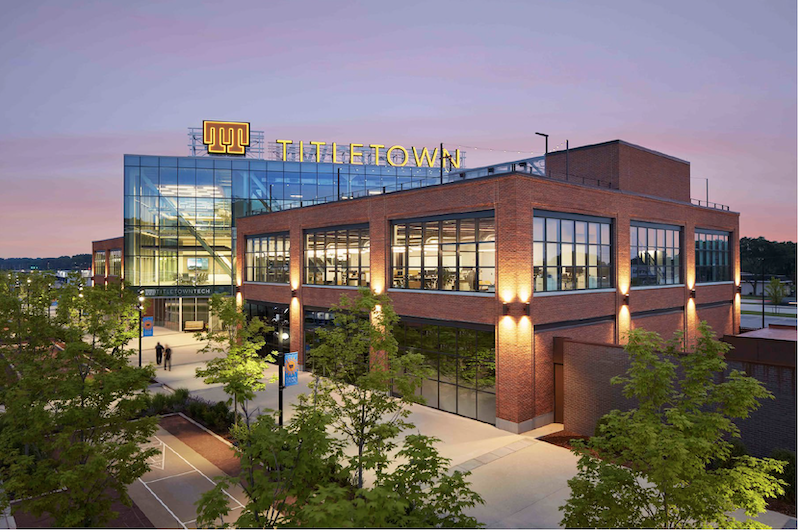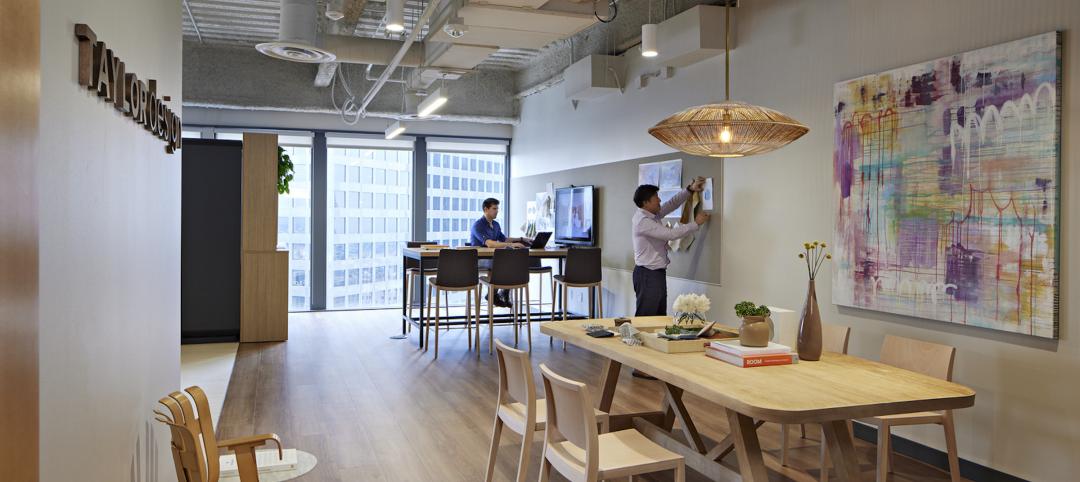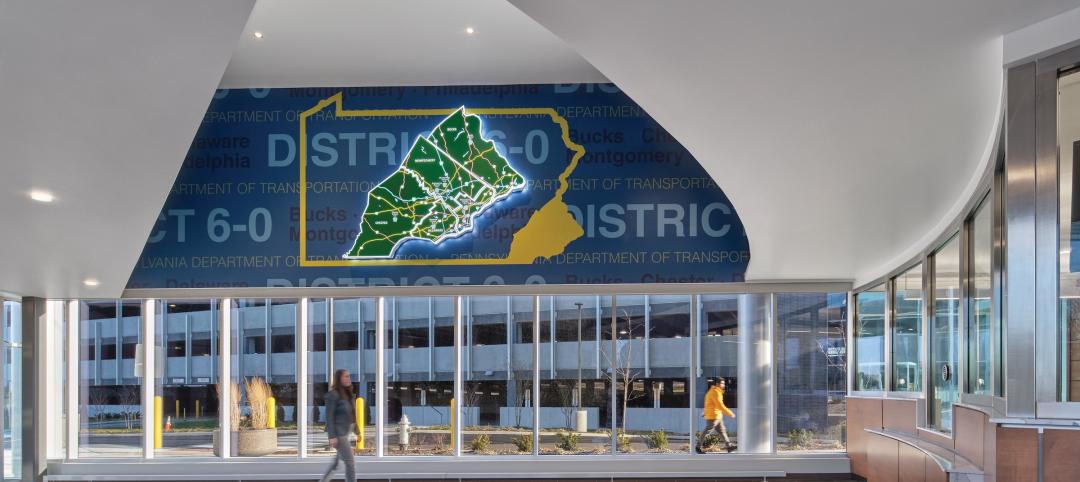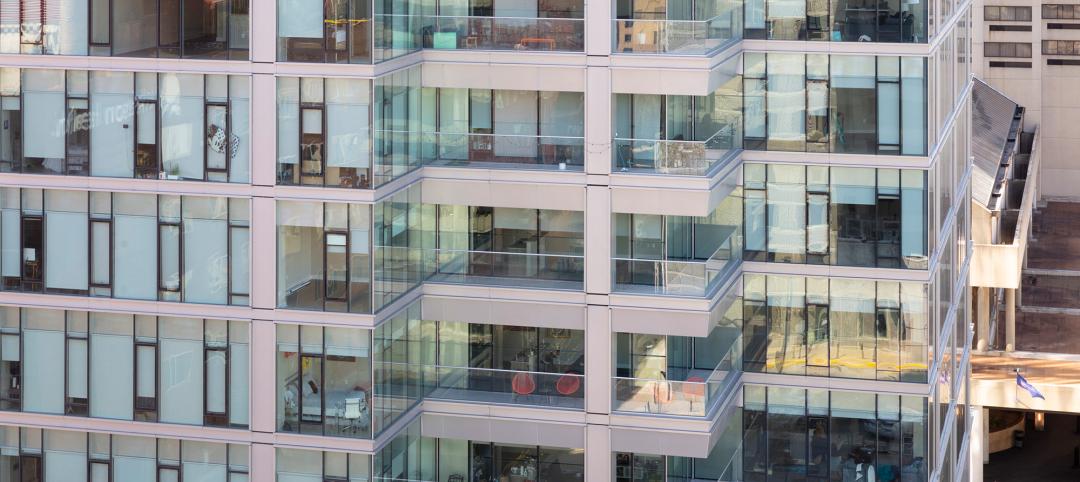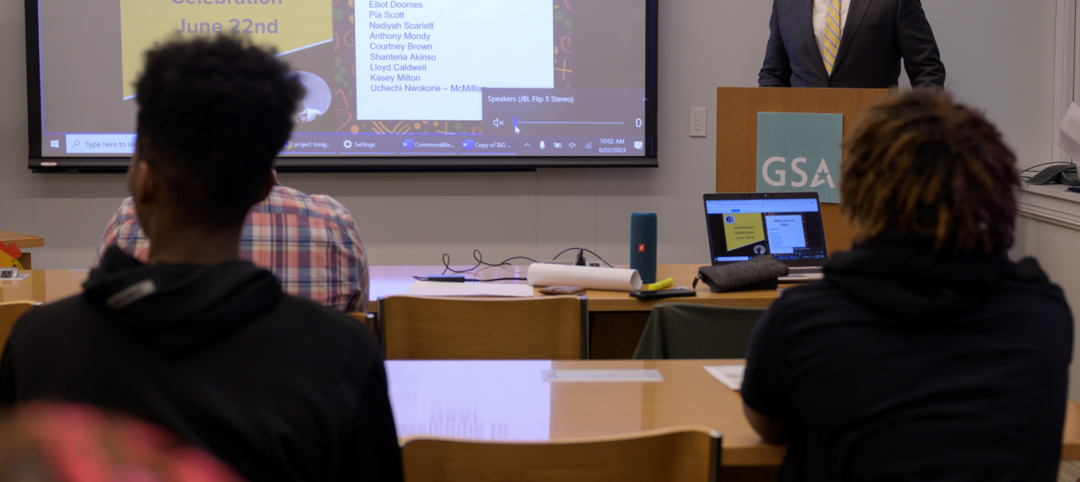Football is often described as game of strategy. So perhaps it wasn’t surprising that the Green Bay Packers, through a joint venture between the team’s development arm and Microsoft, recently opened TitletownTech, a 50,000-sf innovation center in Green Bay, Wis., that is set up to cultivate and provide financial support to high-growth startup companies.
SGA, the architect on this project, has created a three-level “stage on which innovation and collaboration can flourish,” states Brooks Slocum, the firm’s New York Studio Manager. He elaborates that the building’s design applies “spatial strategies” that “maximize” proximity, flexibility and spontaneity.
The design reflects Wisconsin’s old mill buildings, showcasing brick, steel, and wood. Those features are juxtaposed with high-tech glass and state-of-the-art materials.
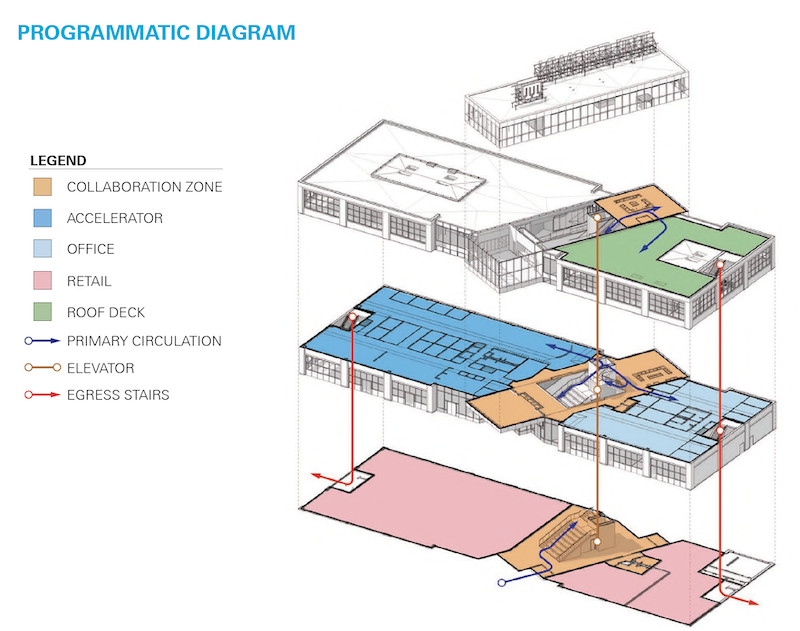
TitletownTech is designed and organized into three levels that promote user collaboration and interaction. The second floor is devoted mainly to office space.
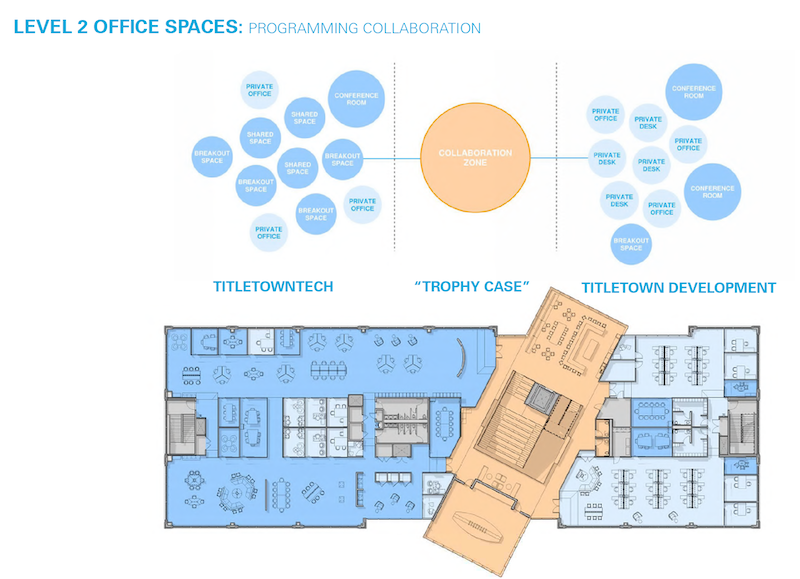
Three components drive TitletownTech, which actually has been operational since last summer but had its grand opening on October 18:
•An innovation lab, focused on creating new ventures: where entrepreneurs and established regional businesses can engage to develop ideas, explore disruptive new business models and next-generation technology solutions. The first floor includes flexible seating reminiscent of stadium bleachers. Informal lounges and social spaces are interspersed throughout the building. “Hot spots” allow guests to congregate for impromptu meetings. And “sandbox” spaces are equipped with oversized writable magnetic walls to help users flesh out ideas and discussions.
•A venture studio, focused on building ventures: where new and emerging business models and scalable industry solutions are developed into stand-alone startup ventures. Microsoft will have employees based at TitletownTech, including a Technologist in Residence, who can be resources for entrepreneurs. Microsoft’s TechSpark initiative—a civic program created to focus on communities in six states that include Wisconsin—will also have a representative on site. (Microsoft’s agenda at TitletownTech includes its goal to eliminate the rural broadband gap for millions of Americans.)
•A venture fund, focused on funding and investing in high-growth startups aligned with industries in Northeastern Wisconsin that will bring opportunity to the region. As of last October, the venture fund had $25 million, and its limited partners include AmeriLux International, Baird, Cornerstone Foundation of Northeastern Wisconsin, Dickman Ventures, Green Bay Packaging, N.E.W. Venture Foundry, Plexus, Schreiber, Schneider, Sartori Cheese, The Village Companies and Weyers Investments, Delaware North, New York Mets and Sterling Project Development.
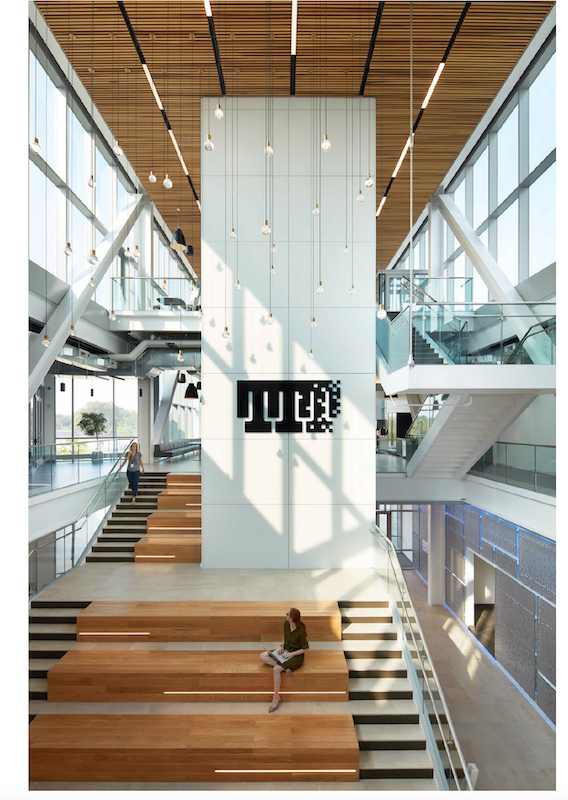
The first floor of an expansive atrium features flexible seating that suggest stadium bleachers, and encourages people to interact as that move from level to level.
TitletownTech is integrated into the Packers’ 45-acre Titletown District, located west of the team’s Lambeau Field stadium. The District’s 20-acre first phase, completed in 2017, includes a hotel, retail, restaurants, and sports medicine center. Phase 2, whose construction began last June, focuses on residential and commercial buildings, including at least 54 townhouses under constuction, as well as a five-story office building, and 152-unit apartment building. So far, the Packers have invested $170 million in its Titletown District.
“Northeastern Wisconsin has a burgeoning entrepreneurial ecosystem, and we felt Titletown would be a perfect place to further spur economic expansion in the region and beyond by bringing world-class digital innovations and expertise to Greater Green Bay,” explains Aaron Popkey, a spokesman for the Green Bay Packers. He goes on to say that TitletownTech will serve as a creative center where digital solutions are developed for key market challenges.
TitletownTech is already working with a handful of companies that include Oculogica, a digital healthcare firm that has developed the EyeBOX, the first FDA-approved neuro-diagnostic device that uses proprietary and innovative technology to track eye novement to determine if a person has a concussion (a tool that might benefit the football team directly).
Through BIM coordination, SGA and Miron Construction, TitletownTech’s CM, reduced the innovation center’s construction costs by between 1.5% and 3%. Utilizing Enscape software’s real-time rendering capabilities, SGA’s models represented the actual materials, design intent, specifications, detailing, and coordination. The models helped to identify, for example, that structural beam openings were too small, and that a large fan in the building’s atrium needed a framing system and mounting points.
Preconstruction visualization for the innovation center, offices, and boardroom also provided scheduling savings. And the team was able to spot MEP/FP clashes and re-route systems in a 3D clash-protection process.
Editor's note: Some information about Titletown Tech, and comments from Green Bay Packer spokesman Aaron Popkey, were added after the initial posting of this article.
Related Stories
Adaptive Reuse | Nov 1, 2023
Biden Administration reveals plan to spur more office-to-residential conversions
The Biden Administration recently announced plans to encourage more office buildings to be converted to residential use. The plan includes using federal money to lend to developers for conversion projects and selling government property that is suitable for conversions.
Office Buildings | Oct 30, 2023
Find Your 30: Creating a unique sense of place in the workplace while emphasizing brand identity
Finding Your 30 gives each office a sense of autonomy, and it allows for bigger and broader concepts that emphasize distinctive cultural, historic or other similar attributes.
Biophilic Design | Oct 29, 2023
Natural wood floors create biophilic experience in Austrian headquarters office
100% environmentally friendly natural wood floors from mafi add to the biophilic setting of a beverage company office in Upper Austria.
Government Buildings | Oct 27, 2023
A spurt in public spending bolsters AEC firms' government building practices
Nonresidential public construction spending, while only about a quarter of private-sector spending, has been growing at a much faster clip lately. In June, it was up 13.8% to $411.4 billion, with commercial and manufacturing the biggest subsectors, according to Commerce Department estimates.
Office Buildings | Oct 19, 2023
Proportion of workforce based at home drops to lowest level since pandemic began
The proportion of the U.S. workforce working remotely has dropped considerably since the start of the Covid 19 pandemic, but office vacancy rates continue to rise. Fewer than 26% of households have someone who worked remotely at least one day a week, down sharply from 39% in early 2021, according to the latest Census Bureau Household Pulse Surveys.
Biophilic Design | Oct 18, 2023
6 ways to integrate nature into the workplace
Integrating nature into the workplace is critical to the well-being of employees, teams and organizations. Yet despite its many benefits, incorporating nature in the built environment remains a challenge.
Office Buildings | Oct 16, 2023
The impact of office-to-residential conversion on downtown areas
Gensler's Duanne Render looks at the incentives that could bring more office-to-residential conversions to life.
Government Buildings | Oct 10, 2023
GSA names Elliot Doomes Public Buildings Service Commissioner
The U.S. General Services Administration (GSA) announced that the agency’s Public Buildings Service Commissioner Nina Albert will depart on Oct. 13 and that Elliot Doomes will succeed her.
Products and Materials | Sep 29, 2023
Top building products for September 2023
BD+C Editors break down 15 of the top building products this month, from smart light switches to glass wall systems.
Office Buildings | Sep 28, 2023
Structural engineering solutions for office-to-residential conversion
IMEG's Edwin Dean, Joe Gulden, and Doug Sweeney, share seven key focuses for structural engineers when planning office-to-residential conversions.


